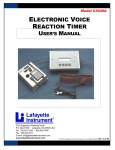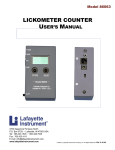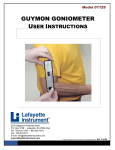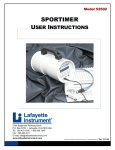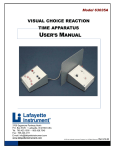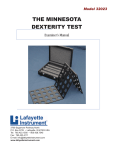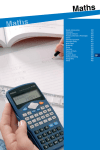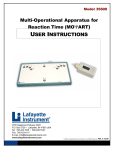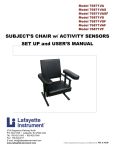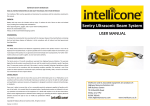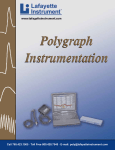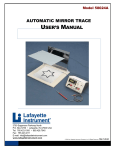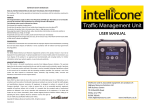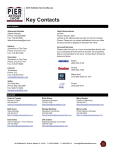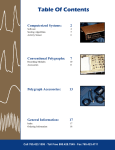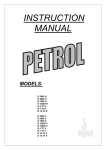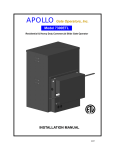Download Lafayette 32025 Grooved Pegboard Test Manual
Transcript
Model 32025 User’s Manual Model 32025 GROOVED PEGBOARD TEST USER INSTRUCTIONS 3700 Sagamore Parkway North P.O. Box 5729 • Lafayette, IN 47903 USA Tel: 765.423.1505 • 800.428.7545 Fax: 765.423.4111 E-mail: [email protected] www.lafayetteinstrument.com © 2002 by Lafayette Instrument Company, Inc. All Rights Reserved- Fax: 765-423-4111 . www.lafayetteinstrument.com . E-mail: [email protected] Rel. 9.2.03 2 Lafayette Instrument Grooved Pegboard Test Table of Contents: System Description Instructions to the Test Supplementary Instructions (Adult, Adolescent): Supplementary Instructions (Kiddie): Scoring: Interpretation: Norms: Norms by Age and Sex Kiddie-Adolescent Age Curve Reference Points (Trites) Scores Reference Data (Misc.) Scores References: Ordering Information: 2 3 3 4 4 4 5 6 7 8 9 10 3700 Sagamore Parkway North . PO Box 5729 . Lafayette, IN 47903 USA . Ph: 765-423-1505 Model 32025 3 User’s Manual Description: The following administrative instructions and age curve data are taken from the Neuropsychological Test Manual developed by Dr. Ronald Trites, Royal Ottawa Hospital, Ottawa, Ontario, Canada. Three batteries of tests have been defined for the normative data obtained by Trites. Adult: Adolescent: Kiddie: Age 15 years 0 months and above Age 9 years 0 months to 14 years 12 months Age 5 years 0 months to 8 years 12 months The Grooved Pegboard is a manipulative dexterity test. This unit consists of 25 holes with randomly positioned slots. Pegs, which have a key along one side, must be rotated to match the hole before the can be inserted. This test requires more complex visual-motor coordination than most pegboards. Instructions to the Test: The pegboard is placed in mid-line with the subject so that the board is at the edge of the table and peg tray immediately above the board. The examiner explains the test: “This is a pegboard and these are the pegs. (Examiner points out each and then picks up one of the pegs and continues.) All the pegs are the same. They have a groove, that is, a round side and a square side and so do the holes in the boards. What you must do is match the groove of the peg with the groove of the board and put these pegs into the holes like this. (The examiner demonstrates by filling the top row. Remove the pegs, putting them back into the tray.) When I say go, begin here and put the pegs into the boards as fast as you can, using only your (dominant) hand. Fill the top row completely from this side to this side. Do not skip any; fill each row the same way you filled the top row. Any questions? Ready, as fast as you can, go.” Fax: 765-423-4111 . www.lafayetteinstrument.com . E-mail: [email protected] 3 4 Lafayette Instrument Grooved Pegboard Test Supplementary Instructions (Adult, Adolescent): For the right hand trial, the examiner demonstrates that the pegs are placed from subject’s left to right, and from right to left for the left hand trial. The dominant hand trial is administered first, followed by the nondominant hand trial. The examiner encourages the subject to perform the task as quickly as possible, telling him or her to speed up if necessary. The pegs must be put in the board in the exact order and in the correct direction. Frequently, it will be necessary to point out the first hole of a new row, particularly during the nondominant hand trial. Only one peg is to be picked up at a time and the subject should immediately be told if ore than one is picked up. Also, only one hand is to be used. Occasionally, a subject will attempt to use his or her other hand to help turn the peg around. It may be necessary to tell the subject to keep the hand on his or her lap, or for the examiner to hold it. If necessary, the board should be held steady for the patient. In the case of severe motor impairment, the subject should attempt the task just to see if any of the pegs can be put in. Any factor that may effect the subject’s performance should be noted, e.g. sore finger, bandage, etc. If a peg is dropped to the floor, the examiner should not make an attempt to pick it up during the trial; rather, one of the pegs correctly placed should be taken out and used again. (Usually, the first or second peg.) Supplementary Instructions (Kiddie): The description, materials needed, instructions and scoring for the Kiddie version are identical in all aspects to the Adult version, with the following exception. Only the first two rows of the Pegboard are to be filled, thus totaling 10 pegs. Particular care is necessary in pointing out the correct direction, as well as the correct sequential order. If a child uses the wrong order (puts 10 pegs in randomly because he is unable to put them in the correct order), the test should be given a “D” flag for a non-standard administration. Scoring: Record, in seconds, the length of time required to perform each trial beginning when the subject starts the task until the last peg is put in, or the test is discontinued. A trial may be discontinued after five minutes. In such cases, the difficulty is described and the scores are given “A” flags indicating an incomplete test. The second score is the number of “drops” made during each trial. A “drop” is any unintentional drop of a peg from the time the subject attempts to pick up the peg from the try until it is placed correctly in the hole. If more than one peg is picked up from the tray and the subject intentionally discards all but one of the pegs, it is not considered a drop. If a peg is intentionally laid down on the side of the tray or table, in order to purposefully manipulate the peg, it is not considered a drop. If one peg is turned with the hand not being 4 3700 Sagamore Parkway North . PO Box 5729 . Lafayette, IN 47903 USA . Ph: 765-423-1505 Model 32025 User’s Manual 5 Scoring (continued): tested, this is noted. If, however, this occurs more than once, the score is given a “D” flag for a nonstandard assessment. The third score is the number of pegs correctly placed in the holes for each trial. The task is performed once with the dominant and then once with the non-dominant hand. For each hand, the three scores are summed (the total time, total number of drops and the total number of pegs correctly placed in the board) to get complete score. Interpretation: When a test such as the Grooved Pegboard test is to be used for personnel selection, the ideal procedure is to establish its validity locally, by testing all newly hired employees and correlating scores with their subsequent performance (supervisor ratings or time they remain employed). This approach to validation requires that test scores should not be used to select employees until evidence has accumulated of its validity, and that test scores be inaccessible to supervisors or others who affect the worker’s ratings or job longevity. An alternative validation procedure is to administer the test to all present employees and correlate scores with ratings or with subsequent performance (Anastasi, 1982, pp. 65-101). The Grooved Pegboard test should correlate most highly with those jobs, which require speed, finger dexterity, and manual dexterity. It should be of relevance to performance on assembly and machine operating jobs. We at Lafayette Instrument Company are always interested in validation data, which you may collect in various industrial settings or academic studies. Of course, scores on such a test are of diagnostic utility in Neuropsychological practice only within the context of an extensive sampling of medical, cognitive, motor, sensory and personality factors. Keeping this provision in mind, it should be noted that Matthews, Cleeland & Hopper (1970) found that patients with multiple sclerosis (MS) were significantly slower than “control” patients with other central nervous system impairments. MS patients (N = 30) had a mean of 323.40 seconds (S.D. = 176.98) while controls (N = 30) had a mean of 171.77 seconds (S.D. = 48.20). The difference was significant (t = 5.13, p. = .01, r = .690). Out of 24 tests in the study, those “of considerable utility in inter-group discrimination p. 6) were Grooved Pegboard Test, the Static Steadiness Test (equivalent to Lafayette #32011), the Maze Coordination Test (similar to Lafayette #20015) and measure of Finger Tapping speed. Fax: 765-423-4111 . www.lafayetteinstrument.com . E-mail: [email protected] 5 6 Lafayette Instrument Grooved Pegboard Test Norms by Age and Sex Kiddie-Adolescent (Total test time in seconds) Male Dominant 6 Non-Dominant Dominant Female Non-Dominant Age M SD M SD M SD M SD 5 70 33.9 75 38.1 66 32.3 73 36.8 6 58 26.1 64 33.9 63 31.2 65 30.1 7 48 24.6 51 22.0 53 24.8 58 19.9 8 38 9.02 41 14.6 38 10.4 47 26.8 9 84 19.5 92 23.8 90 54.0 96 50.6 10 83 36.5 90 28.9 84 18.1 92 24.4 11 76 18.1 86 31.0 79 17.0 92 24.8 12 78 24.4 85 32.2 80 19.5 87 21.6 13 78 40.5 81 23.8 81 52.6 84 42.4 14 79 25.2 86 44.5 77 54.3 78 17.6 3700 Sagamore Parkway North . PO Box 5729 . Lafayette, IN 47903 USA . Ph: 765-423-1505 Model 32025 7 User’s Manual Grooved Pegboard Age Curve Reference Points (Trites) Male Dominant Age 15 16 17 18 19 20 21 22 23 24 25 26 27 28 29 30 31 32 33 34 35 36 37 38 39 40 41 42 43 44 45 46 47 48 49 50 M 80 81 82 82 83 83 84 84 85 85 86 87 87 87 88 88 89 90 90 91 91 91 92 92 93 94 95 95 95 96 97 97 97 98 98 99 Low/High 36/103 35/105 35/107 36/110 37/113 38/117 39/121 40/125 41/128 41/131 42/133 42/134 43/135 44/136 44/136 45/137 45/137 46/137 46/137 46/137 46/137 46/137 46/138 46/138 46/138 46/139 46/138 46/138 46/140 47/140 47/141 47/142 47/143 47/144 49/156 50/158 Non-Dominant M 82 82 82 82 83 85 86 87 87 89 90 92 93 94 95 96 98 99 100 101 102 103 105 105 106 108 108 108 109 109 109 109 110 110 110 110 Low/High 49/119 48/120 47/122 47/123 46/124 45/127 45/129 45/131 44/134 44/135 45/137 45/139 46/141 46/143 47/145 48/146 48/148 49/150 49/152 50/153 50/155 50/157 51/159 52/160 52/161 52/162 51/163 51/163 51/165 51/165 52/166 52/166 52/167 52/169 52/170 52/170 Dominant M 82 83 84 84 84 85 85 85 85 85 84 84 84 84 84 83 83 83 83 83 83 83 83 83 85 86 89 90 92 94 98 101 106 108 111 113 Female Non-Dominant Low/High 28/117 27/122 26/127 26/131 25/134 25/137 25/141 26/143 27/144 28/143 30/142 32/140 34/139 36/137 37/135 39/132 40/130 41/127 43/126 44/123 45/121 46/120 46/120 47/119 48/121 48/123 48/125 48/129 47/134 46/140 45/145 44/151 43/158 43/164 42/166 41/170 M 82 82 82 82 83 83 84 85 86 87 88 89 90 102 92 93 93 94 95 95 96 97 98 99 101 102 103 105 106 107 109 111 113 114 117 119 Low/High 59/97 57/98 55/102 53/105 52/109 50/113 49/118 48/121 47/124 47/127 47/129 45/131 46/133 45/135 45/137 45/138 45/139 45/142 45/143 45/144 45/147 46/148 46/149 47/151 47/152 47/154 47/156 48/158 48/160 49/162 49/164 50/166 50/169 50/172 50/174 51/180 The above scores were obtained by adding: time (in seconds) required to fill pegboard, number of “drops” and number of pegs placed in the board. Fax: 765-423-4111 . www.lafayetteinstrument.com . E-mail: [email protected] 7 8 Lafayette Instrument Grooved Pegboard Test Reference Data (Misc.) Dominant Non-Dominant Age Mean SD Mean SD N 9 74.39 15.47 80.77 15.91 56 10 71.88 9.39 76.65 11.75 66 11 68.07 8.64 71.50 10.00 56 12 65.07 8.55 68.94 9.44 53 13 60.96 6.54 65.61 9.38 41 14 65.88 11.88 70.66 8.31 300 15 – 19 66.05 10.40 70.50 11.10 172 20 – 29 63.40 7.90 69.10 18.70 -- 30 – 39 62.95 8.40 67.15 12.20 319 40 – 49 63.50 7.20 69.05 9.80 319 50 – 59 68.10 9.42 74.70 10.51 134 60 + 82.70 18.70 87.95 26.20 100 10 - 59 65.13 9.19 69.99 10.31 1460 Above scores derived without adding number of pegs dropped and number of pegs correctly placed in board to the subject’s time. 8 3700 Sagamore Parkway North . PO Box 5729 . Lafayette, IN 47903 USA . Ph: 765-423-1505 Model 32025 User’s Manual 9 References: Anastasi, Anne. Psychological Testing. (5th ed.). New York: Macmillan, 1982. Haaland, K. York, Cleelan, Charles S., & Carr, Daniel. Motor performance after unilateral hemisphere damage in patients with tumor. Archives of Neurology, 1977, 34, pp. 556-559. Heaton, R.K., Grant, I., & Matthews, C.G., “Differences in neuropsychological test performance associated with age, education, and sex,” Neuropsychological Assessment of Neuropsychiatric Disorders. New York: Oxford, 1986. Klouoff, H. & Low, M. “Disordered brain function in young children and early adolescents: Neuropsychological and EEG correlates,” Clinical Neuropsychology. New York: Wiley, 1974. Knights, R.M. & Moule, P.D., “Normative data on the motor steadiness battery for chidren,” Perceptual and Motor Skills, 26, 1968, 643-650. Matthews, Charles, Cleeland, Charles S., & Hopper, Cornelius L. Neurological patterns in multiple sclerosis. Diseases of the Nervous System, 1970, 31, pp. 161-170. Matthews, C.G. & Healand K., “The effect of symptom duration on cognitive and motor performance in Parkinsonism,” Neurology, 29, 1979, 951-956. Trites, Ronald L. Neuropsychological Test Manual. Ottawa, Ontario, Canada: Royal Ottawa Hospital, 1977. Fax: 765-423-4111 . www.lafayetteinstrument.com . E-mail: [email protected] 9 Lafayette Instrument Grooved Pegboard Test Lafayette Instrument Grooved Pegboard Test Model 32025 User’s Manual Ordering Information: All phone orders must be accompanied by a hard copy of your order. All must include the following information: 1) Complete billing and shipping addresses 2) Name and department of end user 3) Model number and description of desired item(s) 4) Quantity of each item desired 5) Purchase order number or method of payment 6) Telephone number DOMESTIC TERMS There is a $50 minimum order. Open accounts can be extended to most recognized educational institutions, hospitals and government agencies. Net amount due 30 days from the date of shipment. Enclose payment with the order; charge with VISA, MasterCard, American Express; or pay COD. We must have a hard copy of your order by mail or fax. Students, individuals and private companies may call for a credit application. INTERNATIONAL PAYMENT INFORMATION There is a $50 minimum order. Payment must be made in advance by: draft drawn on a major US bank; wire transfer to our account; charge with VISA, MasterCard, American Express; or confirmed irrevocable letter of credit. Proforma invoices will be provided upon request. RETURNS Equipment may not be returned without first receiving a Return Goods Authorization Number (RGA). When returning equipment for service, please call Lafayette Instrument to receive a RGA number. Your RGA number will be good for 30 days. Address the shipment to: Lafayette Instrument Company, 3700 Sagamore Parkway North, Lafayette, IN 47904, U.S.A. Shipments cannot be received at the PO Box. The items should be packed well, insured for full value, and returned along with a cover letter explaining the malfunction. Please also state the name of the Lafayette Instrument representative authorizing the return. An estimate of repair will be given prior to completion ONLY if requested in your enclosed cover letter. We must have a hard copy of your purchase order by mail or fax, or repair work cannot commence. WARRANTY Lafayette Instrument guarantees its equipment against all defects in materials and workmanship to the ORIGINAL PURCHASER for a period of one (1) year from the date of shipment, unless otherwise stated. During this period, Lafayette Instrument will repair or replace, at its option, any equipment found to be defective in materials or workmanship. If a problem arises, please contact our office for prior authorization before returning the item. This warranty does not extend to damaged equipment resulting from alteration, misuse, negligence or abuse, normal wear or accident. In no event shall Lafayette Instrument be liable for incidental or consequential damages. There are no implied warranties or merchantability of fitness for a particular use, or of any other nature. Warranty period for repairs or used equipment purchased from Lafayette Instrument is 90 days. DAMAGED GOODS Damaged equipment should not be returned to Lafayette Instrument prior to thorough inspection. When a shipment arrives damaged, note damage on delivery bill and have the driver sign it to acknowledge the damage. Contact the delivery service, and they will file an insurance claim. When damage is not detected at the time of delivery, contact the carrier and request an inspection within 10 days of the original delivery. Please call the Lafayette Instrument Customer Service Department for a return authorization for repair or replacement of the damaged merchandise. Lafayette Instrument Co. Europe 3700 Sagamore Parkway North 4 Park Road, Sileby, P.O. Box 5729 • Lafayette, IN 47903 USA Loughborough, Leics., LE12 7TJ. UK. Tel: 765.423.1505 • 800.428.7545 Tel: +44 (0)1509 817700 Fax: 765.423.4111 Fax: +44 (0)1509 817701 E-mail: [email protected] E-mail: [email protected] www.lafayetteinstrument.com 3700 Sagamore Parkway North . PO Box 5729 . Lafayette, IN 47903 USA . Ph: 765-423-1505










